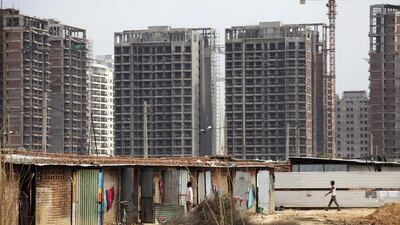Gurgaon, which is often known as India’s Millennium City, and symbolises the country’s aspirations to be the world’s back office, has a new name. Gurugram is supposed to more closely link the modern glass and chrome city to its ancient Hindu roots, as told in the Sanskrit epic the Mahabharata. Back then, it was the gram (Sanskrit for village) of the guru (teacher) Dronacharya, who tutored the royal princes in the arts of warfare.
That’s a proud history by any reckoning and worthy of being recognised in gold letters in books on mythology. But does Gurugram have to find a place on international maps, and in official documentation? There’s been little local clamour for the change. The commercial implications may be difficult. After all, the city formerly known as Gurgaon houses the local offices of a couple of hundred Fortune 500 companies and has become an established name as a global corporate hub. Even in the age of email, changing a postal address can be unsettling for international business, at least in the short term.
In the long term, changing a well-known place name may prove to be a purely symbolic gesture, which raises the question: what’s the point? Consider India’s infotech city Bangalore. It was rechristened Bengaluru in 2014 but the change has barely registered in popular discourse. It could be argued that there’s been little to show for the Bangalore to Bengaluru transition except for a slew of headlines and several good stories about boiled beans.
Further back in time, there was the 1996 change of the metropolitan melting pot Bombay to Mumbai, but both names remain in popular use.
South Africa has similarly found that an established place name can become a stubborn habit, defeating attempts to reconstruct national identity using history and legend. For instance, the port city of Durban, now confusingly also known by its Zulu name eThekwini. And Pretoria, now also known as Tshwane. The world still uses the old names for Durban and Pretoria – to sell flights, hotels and jobs. Those names remain the dateline for news stories filed by the international media. The rechristening seems an irrelevance even though it arguably speaks to South Africa’s altered political reality. For, Durban was originally called “d'Urban” after the British governor of the Cape Colony, and Pretoria was named after a Boer leader. Their names were ideological tools of colonial possession and it is not outrageous for postcolonial societies to seek to scrub them clean.
But only if the change can be made to stick and is perceived as more than a cosmetic distraction. This is the domestic criticism being levelled at last week’s sudden announcement that the Czech Republic is renaming itself Czechia.
As Czech journalist Jakub Patocka wrote in The Guardian, having a simpler name – a single word with just three syllables – is no justification for such an enormous change without national consultation. Changing our country’s name won’t solve the problems, he said.
So why do governments continue to do it? Stanford professor Donald Emmerson, who has written extensively on the creation from nothing of a label for a whole region – South East Asia – says that “names are rooted neither in reality nor in custom but express instead the power of the namer”.
Indeed, place names can be an invaluable guide to who’s in charge and how they want a place to see itself and be seen. In 150 years, about 25 name changes – of state institutions, schools, universities, factories, museums, sport clubs – have taken place in the Serbian capital Belgrade. They reflected the city’s many political, economic, demographic, and cultural transitions and served the purpose of constructing and reconstructing political, ethnic, religious and cultural identity.
But every name change signifies a social, cultural or political struggle for control and is freighted accordingly. Pretoria’s white population has always believed that it is a denial of their history to change the city’s name to that of an 18th century Zulu leader who founded a tribal settlement in the area. Indians who don’t subscribe to the governing Hindu nationalist BJP’s worldview see Gurgaon-to-Gurugram as an atavistic and unnecessary development.
Interestingly, the United States has traditionally displayed relatively little zeal about renaming everything in sight. New England, New Hampshire, New York and Boston, for instance, retain the names originally bestowed by the English colonisers. Some little time after the American Revolution, Charles Town in South Carolina was simply shortened to Charleston. The big change was the renaming of Kings’ College, founded by royal charter of King George II of England. It became Columbia University, a name that was supposed to embody the patriotic fervour that had inspired the battle for liberty. But the developing world’s mania for erasing colonial-era names is noticeably absent in North America.
So what does the change from Gurgaon to Gurugram say about 21st-century India? That the Hindu nationalist BJP is in power. But more crucially, it preserves the impression of a nation on the move, reclaiming its sense of a glorious ancient self while it confidently forges ahead. Fundamentally though, it alters nothing. Certainly not, as Indian cricketer Gautam Gambhir has written, the reality of “today’s Gurgaon”. Mr Gambhir says that “the place needs local transport, regular water and power supply, affordable housing, waste management and a safe environs for women more than a name change”.
There’s the rub. Giving a place a new name can seem a cheap and easy substitute for real change.
Rashmee Roshan Lall is a writer on world affairs
On Twitter: @rashmeerl


